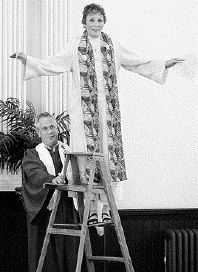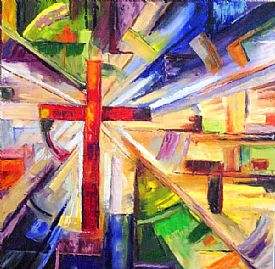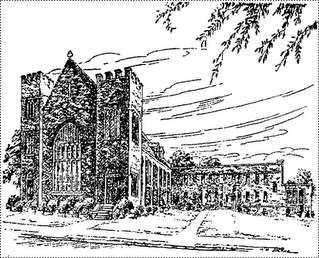Letters From the Field: Lenten Letter No. 5
Letters From the Field
Monday, March 10, 2008: Lenten Letter No. 5
What I Live For (Out of the Shadows, to the Eternal Light)
I once read a question: “And what do we live for if not to make life a little easier for others?”
As a follower of the Christian faith, I can’t think of a better goal for life.
Jesus often spoke of a coming Kingdom, the Kingdom of God. This Kingdom is described as a place of great peace, justice and beauty. That world will come into existence and be maintained because humankind will have become subject to the Mind of God (Isa. 11: 9).
As I have tried to explain earlier, we need not harbor a dread of God. Our Creator has but one overall goal in mind: that we should flourish in peace and security; He seeks our eternal well-being (Jer. 32: 40-41 and Rev. 22:2). If we work to create a circle of love between ourselves, our fellow human beings, and the God who means to do us good, we create an atmosphere of security and confidence. There is no longer any reason to fear our neighbors, for we see them as a “safe place” (Isa. 32: 1, 2).
“Let this mind be in you,” advises the apostle Paul. Why? Because the mindset that defined the character of Christ is the only way of thinking that will produce lasting peace, wholeness of mind, body and spirit (Philippians 2:5, then verse 4).
There are many in this world who believe world peace is impossible. Well, they are right! If people keep thinking the way they do and stay the way they are no peace will ever come to them.
As the saying goes, “No God, no peace. Know God, know peace.”
Jesus’ message, his Gospel, can be summed up this way: “Change your way of doing things. Change your way of thinking! The Kingdom of God is coming! All that is false, all that is destructive, will be swept away! Accept the Invitation! The Father who sent me is offering you an everlasting Transformation. We will bring you a clear teaching of real hope. We will prove this to all: Love works, now and forever. ‘The glory of the LORD (His transforming love) will be revealed. All the people will see it together. This promise is straight from the mouth of God Himself!’ (Isa. 40:5). The promise to Abraham will be fulfilled; his children, after the Spirit, will be a blessing to all the nations!”
Symbols are useful to most of us. They serve as little reminders of important ideas or principles. My personal symbol of the afore-mentioned hope is a royal blue ribbon with a six-pointed star attached to it. (I call it my “think the Kingdom way” ribbon.) It is a symbol that I am part of that “royal Priesthood” mentioned in Exodus 19:6 and 1Peter 2:9. Jesus, the living Word of the God of the Kingdom, is the star, the source of light and life to which I must look. Of course, I cannot put my trust in princes, presidents, or prelates. All too often, they are guided by another “star.”
I am convinced of this: if we truly devote ourselves to the principles of the Kingdom of God, we can overcome anything. By way of the Spirit (the very Mind and Life of God Himself), we will climb to unimagined heights. The seas will part before us and we will become the very People alluded to in my poem “We Only Dread Standing Still”
Brighter and brighter
Grows the Light of our understanding
Deeper and deeper
Reach the roots of our will
Into the fertile ground of Love.
Wider and wider
Spread our branches, laden
With the fruits of the Spirit
Over the fields where the hungry go a-gleaning.
The leaves of the trees of the LORD
Will heal the parched with their shade
Even the scorched peoples---
Who wilted in the dry winds of Sin---
Will no longer be confounded,
Will no longer be confused.
“Here are the People of the LORD!”
They will sing.
“Here are the People of our God!”
They will shout.
“Hosanna! Hosanna! The Messiah
---and His Anointed Ones---
Have come to us at last!
Hosanna! Hosanna! Blessed are they who come
In the name of the LORD!”
The Kingdom and its King are coming. It is as sure as the rising of tomorrow’s sun, because the God who lives to do us good has determined it.
What else can I say to these things? Only this: immerse your mind in “Kingdom-think.” Give yourselves over to the Love, the Mind, of God. He is for us, who can be against us?
What do we live for? Why, to be the People of the Kingdom, of course! What else?
Peace to you all,
W. Arthur Herring, Jr.



